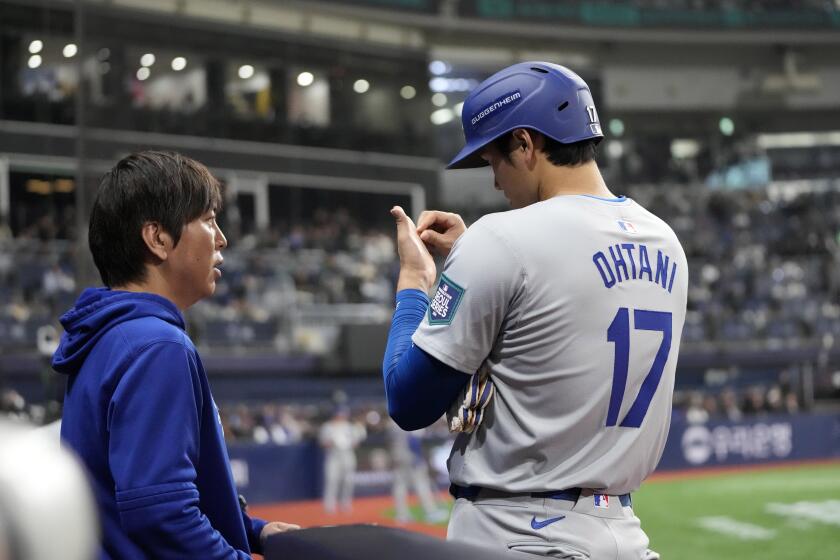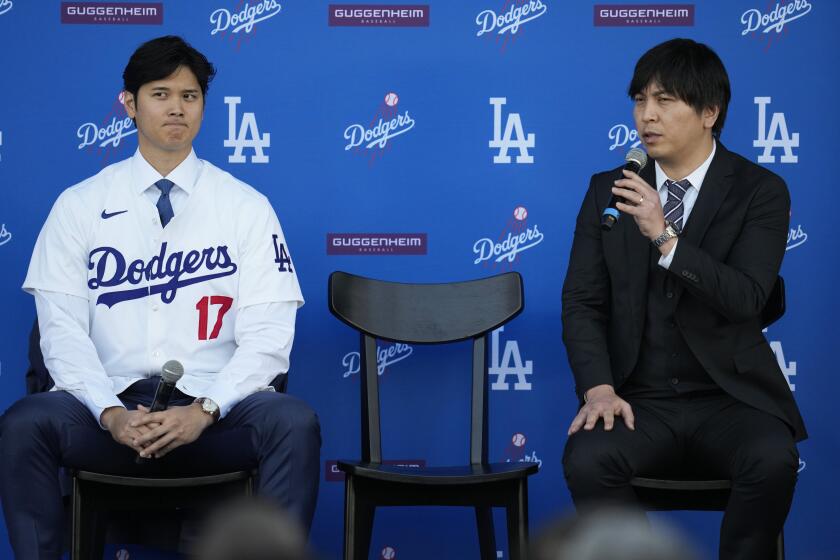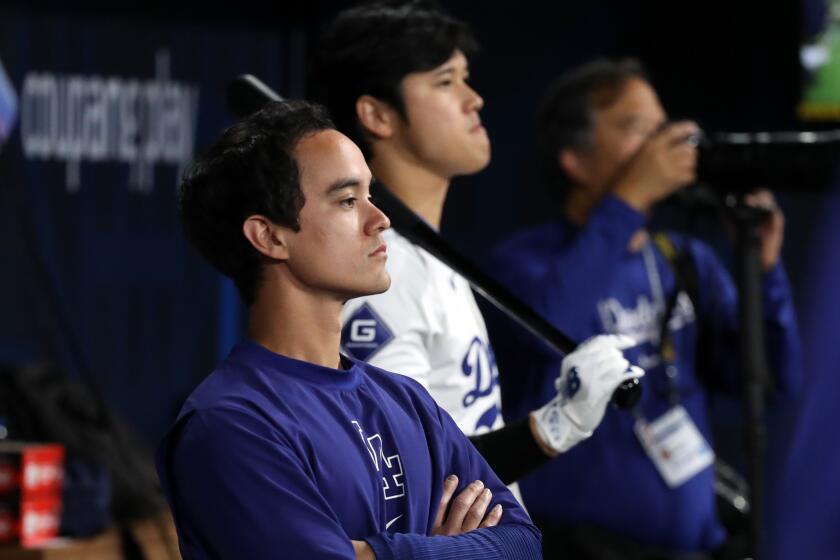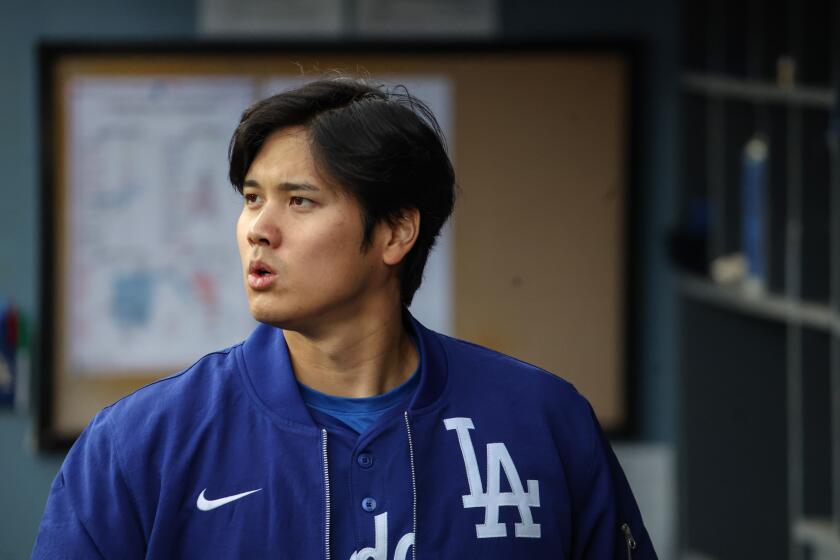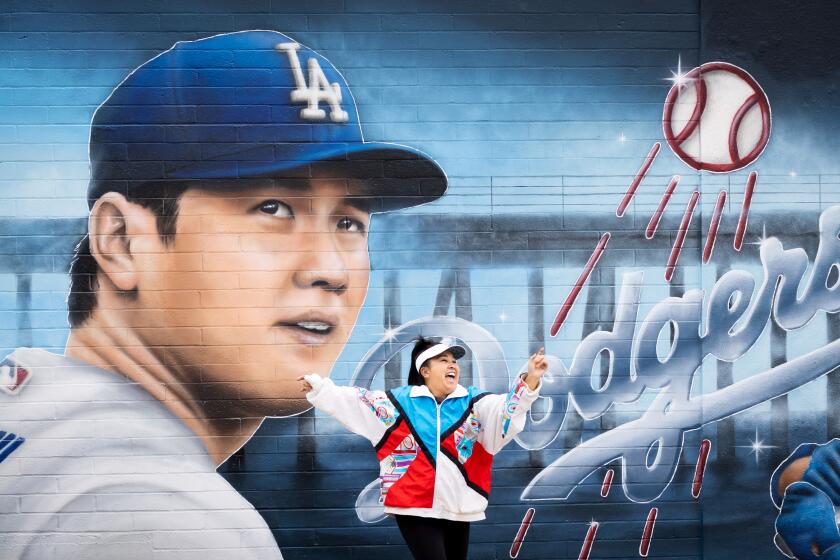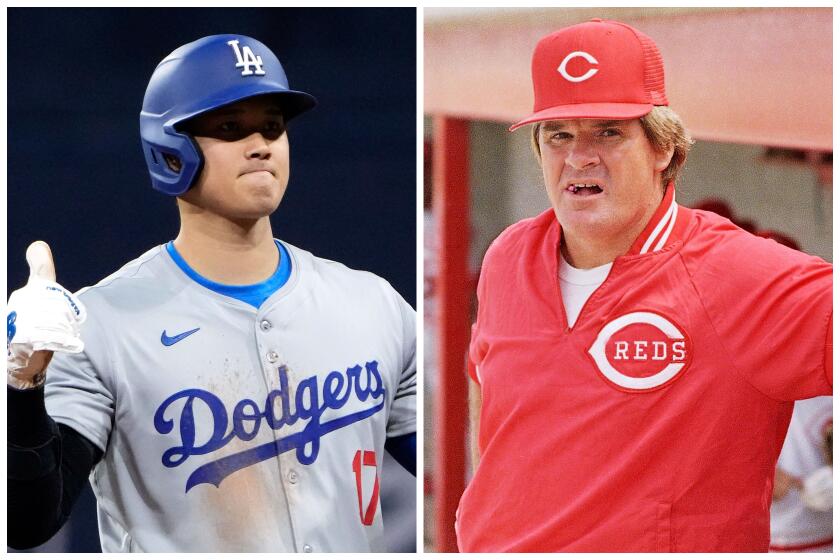Is Shohei Ohtani too big to fail?
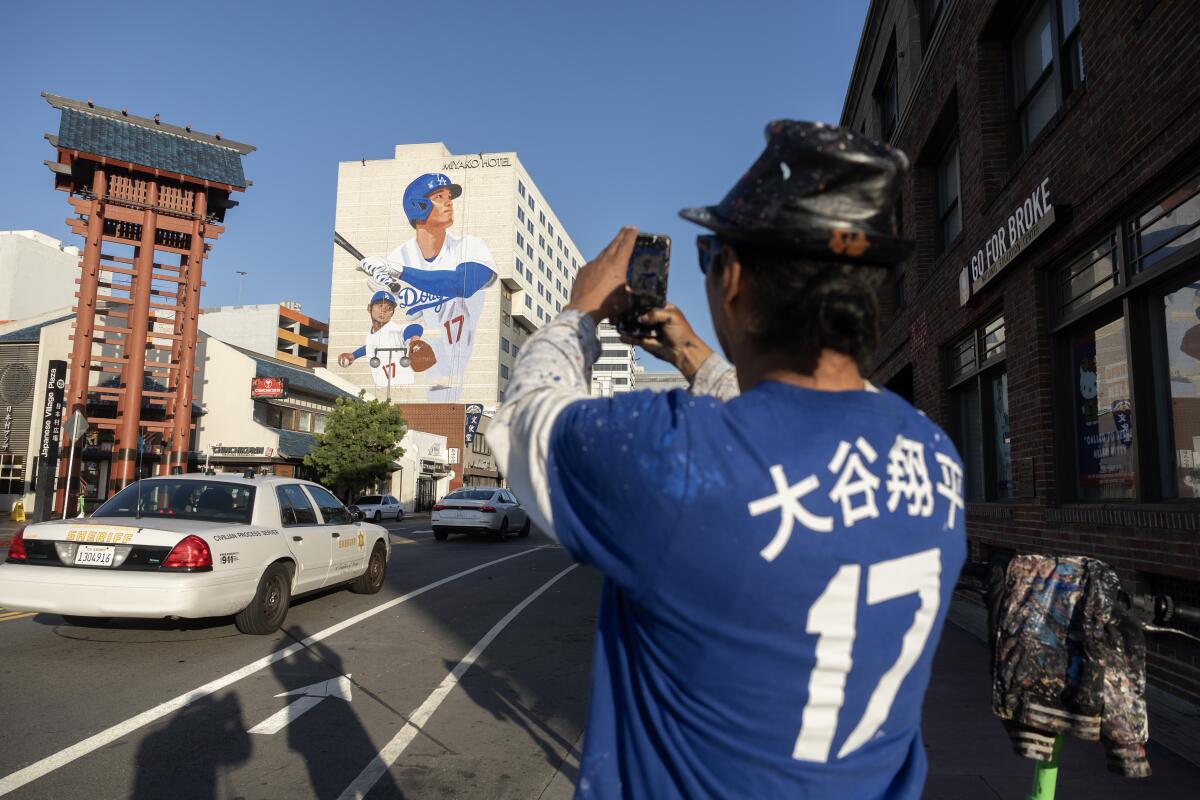
- Share via
Shohei Ohtani looms large over Little Tokyo.
His towering 150-foot visage on the side of the Miyako Hotel is only the latest, most obvious sign of the mania — and huge financial prospects — surrounding the Dodgers’ two-way superstar.
Soon, crowds of tourists, from around the region and as far away as Japan, are expected to descend on Little Tokyo, and the small businesses there are ready. There will be special Ohtani-related deals at 31-year-old restaurant Mr. Ramen. Udon restaurant Marugame Monzo already has a window display with stuffed Totoros wearing Dodgers batting helmets and jerseys, an Ohtani pennant proudly centered.
Where Ohtani goes, the money follows. That’s why you could almost hear a collective sigh of relief when Ohtani categorically denied this week, ahead of the Dodgers’ home opener Thursday, that he never bet on sports, or anything else, for that matter.
And it wasn’t just relief from true-blue Dodger fans who are looking to Ohtani to bring World Series glory to the team they love. Many businesses, corporate sponsors and private investors, not to mention Major League Baseball and the city of Los Angeles, all have a big stake in Ohtani’s ongoing success. Never mind baseball, an unblemished Ohtani represents a sky full of financial rainbows.
“When you consider the upcoming role the Dodgers and MLB will play in his growing global notoriety, the continued globalization of sports business and baseball more specifically, his long-term potential, [including his] post-career, is enormous,” said David M. Carter, a sports business and marketing expert at USC.
“It is because of this remarkable potential that all those that make money from baseball want him to be in the clear across the board.”
Representatives of Dodgers superstar Shohei Ohtani accused his interpreter of engaging in a ‘massive theft’ of the ballplayer’s funds to place bets with an allegedly illegal bookmaker.
That may take some time as both the MLB and the IRS are investigating the alleged gambling and theft by Ohtani’s friend and former interpreter Ippei Mizuhara. In his first public comments on the matter Monday, Ohtani also made clear that he never knowingly covered for Mizuhara’s losses, something that Mizuhara claimed Ohtani agreed to do.
While there are still many questions to be answered, and some investors are wary, most remain bullish on Ohtani and his future career and potential — as a ballplayer and marketable athlete.
“At least for the time being, I don’t think there’s any worry about what his value is,” said Mark Roesler, chairman and chief executive officer of CMG Worldwide, a Beverly Hills firm that has represented hundreds of famous athletes and other celebrities in branding, marketing and intellectual property management.
“I think Ohtani is on the road to become perhaps the greatest baseball player to play the game,” he said, noting the Japanese ballplayer’s ability to excel as both a hitter and pitcher, something not seen since Babe Ruth. “He’s got enormous potential that stretches around the world. The money is just naturally going to come about at that level.”
Ohtani is already way ahead of anyone else in professional baseball in endorsement earnings, estimated by Sportico at $65 million last year. His roster of sponsors is deep: New Balance, Porsche, Oakley, Hugo Boss, to name just a few.
Ohtani’s biggest sponsors, including New Balance, have remained largely mum about the gambling news involving Ohtani’s ex-interpreter. Most experts say they doubt that Ohtani would have jeopardized his career by betting on games and later telling the world that he never gambled. Still, there may be at least a small cloud hanging over him until the feds conclude their investigation.
Meanwhile, tour operators on both sides of the Pacific are looking to capitalize on his brand. They’re promoting newly designed baseball packages that include Dodger Stadium field tours and increasingly pricey and hard-to-get game tickets, thanks in no small part to Ohtani’s popularity.
“Everyone is long on Ohtani, no one is short,” said Michael Osacky, president of Baseball in the Attic and lead appraiser for PSA, the world’s biggest third-party grader for sports collectors. Recalling the scene at the National Sports Collectors Convention in Chicago last summer, he said, “They were like crazy people looking for anything Ohtani. It was all Ohtani, Ohtani, Ohtani.”
Since the interpreter’s gambling news broke last Wednesday, however, Osacky said the action on Ohtani collectibles has quieted as hedge funds and other parties who have been buying wait for more developments. Still, no one is selling, and some investors said it may be good to load up on Ohtani products.
Last year, an autographed Bowman chrome refractor card of Ohtani in his 2018 rookie year fetched $184,000. The price for a bat that he used to smash his first grand slam: $168,000.
For now, most everyone seems to be pulling for the boyish-faced slugger.
“It’s easier for fans to decouple Shohei from his friend and interpreter,” said Dae Hee Kwak, director of the Center for Sport Marketing Research at the University of Michigan. “If you’re a Shohei fan, you’re just like ... well, it’s Ippei.”
Will Ireton is Shohei Ohtani’s new interpreter for the Dodgers since the firing of Ippei Mizuhara amid a gambling scandal. He’s been with the team since 2016.
The Dodgers organization may have the most at stake, having signed the two-time MVP to a record 10-year, $700 million contract. The MLB has a lot riding on him too as it looks to expand its worldwide reach by tapping into the drawing power of players like Ohtani.
Early this year, the league signed a multiyear partnership with JTB, Japan’s largest travel agency. Japan has long had many baseball fans and produced some star players in the U.S., including Ichiro Suzuki, who is expected to be inducted in the Hall of Fame next year, and former Dodgers pitcher Hideo Nomo. But Ohtani is in a different category, said Kaori Mori, JTB’s branding and PR manager in Tokyo.
“We feel that this situation is making people who never thought of going all the way to the U.S. to watch baseball consider going to the U.S.,” Mori said. She said there was so much demand for the Dodgers-Padres series in Seoul earlier this month that JTB held a lottery for its tour packages.
With JTB and other firms offering more tour specials that include the Dodgers, officials in Los Angeles and California are hoping for a nice bounce in visitors from Japan, one of the oldest and most lucrative markets for the state.
More than 520,000 visitors from Japan are expected to spend some $1.5 billion in California this year. And already some have booked tours just to get a glance of Ohtani, according to anecdotal accounts.
Little Tokyo’s Miyako Hotel, home to the Ohtani mural, expects to see an increase of Japanese tourists after the country’s Golden Week holiday period at the end of April and beginning of May. Ahead of the Dodgers’ home opener, the hotel was already hosting one or two tour groups in L.A. specifically to see Ohtani, said Risa Oyama, sales manager at the hotel.
Shohei Ohtani’s statement blames his interpreter for wiring huge sums from his bank account to a bookmaking operation but leaves questions unanswered.
The hotel, which is part of a Japanese chain, is celebrating Ohtani’s Dodgers debut by offering special blue bread at its cafe and is experimenting with a blue cocktail that will be offered at its karaoke bar.
When renowned muralist Robert Vargas came to hotel executives with the idea for the mural, titled “L.A. Rising,” Miyako representatives figured, why not?
“We were just so excited to hear back in December that (Ohtani) would be joining the Dodgers,” Oyama said. “What can we do as a Japanese hotel to support a Japanese player? No one is as big of an influence as him.”
Like the rest of Little Tokyo, the Miyako’s business suffered during the pandemic as international tourism sputtered and still hasn’t fully recovered. And for the rest of the neighborhood, rising rents and the creeping effects of gentrification in the cultural community have either pushed out longtime businesses, including Suehiro’s Cafe, or forced them to close.
It’s partly why Vargas pitched the mural in the first place. Born and raised in Boyle Heights, Vargas frequented Little Tokyo since he was a child. He felt compelled to boost economic support for Little Tokyo through his work, especially as he saw longtime business owners shut their doors.
“I have a fondness for this area, for this neighborhood,” said Vargas, while sitting on top of the roof near his scaffold. “And being able to contribute a piece of work that I think is about unity and about Angeleno pride, cultural pride, I feel like this mural bridges many cultures together.”
Shohei Ohtani signed with the Dodgers less than two weeks ago, and already there are at least two murals in Los Angeles County featuring the Japanese star.
In the mural, Ohtani faces Dodger Stadium and is depicted both hitting and pitching. Just steps away is Mr. Ramen, which plans to offer specials when Ohtani hits a home run.
“We’re hoping that with the excitement of the town, with all the Ohtani fans coming in and the mural, that we can kind of play off of it,” said Ryusei Yamamoto, who with his two brothers co-owns Mr. Ramen, which was started by their parents.
“As an Asian American, we don’t have too many actors or athletes or famous people that are headlining for a lot of things,” said Yamamoto, who was wearing a Dodgers jersey. “So to see a fellow Asian person do it, I just think it ... attracts a lot of people, it makes people motivated. It gives people dreams, definitely.”
History has shown that players can often return to the sport and overcome problems involving sex scandals and even domestic abuse, but for MLB players, gambling may be harder to recover from, financially speaking.
“The fact that baseball has been such an important part of our culture, that Major League Baseball takes a hard-nosed position on it. As this unfolds, it’s a real dilemma if there is an association with Ohtani,” said Roesler, the Beverly Hills celebrity agent.
Major League Baseball has had gambling issues, from the 1919 Black Sox scandal to Pete Rose’s ban from the game in 1989. Will Dodger Shohei Ohtani be next?
Roesler represented Pete Rose from 1998 to 2003, after the former professional player and manager was banned from MLB for life after detailed evidence emerged that Rose gambled frequently on baseball games as a player and manager.
While CMG helped Rose with various endorsement deals and events like autograph signing, Roesler said, the ban effectively meant Rose couldn’t wear a Cincinnati Reds jersey before the public or benefit from MLB’s many relationships. “It hurt it a lot. We couldn’t do anything that involved Major League Baseball.”
Said USC’s Carter: “The bright flashing light is always integrity of the game — seemingly far more so than other scandals or criminal behavior. Any development that lessens fan confidence in the legitimacy of an event’s outcome is of paramount importance to those doing business in sports. When fans lose confidence, the result can be devastating to a team or league’s cash flow until confidence is restored.”
More to Read
Inside the business of entertainment
The Wide Shot brings you news, analysis and insights on everything from streaming wars to production — and what it all means for the future.
You may occasionally receive promotional content from the Los Angeles Times.
